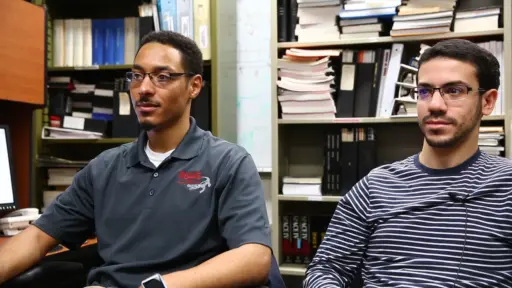As engineers, Mehrdad Arjmand and Aaron Olson strive to make a global impact through their work as researchers and entrepreneurs. The pair recently co-founded NovoMoto—a startup working to provide clean, renewable and sustainable electricity to communities in the Democratic Republic of Congo (DRC). In the DRC, many people live without access to affordable grid electricity. Residents often spend almost one-third of their income on kerosene for lamps, or on local diesel generators. By installing home and business solar systems and setting up microgrids, Olson and Arjmand aim to address this problem and help improve the lives of 68 million people in the DRC.
 NovoMoto co-founders Aaron Olson (left) and Mehrdad Arjmand. NovoMoto hopes to help DRC villagers light their homes with battery-powered LED bulbs rather than kerosene lamps, which provide dim lighting and can contribute to respiratory illness.
NovoMoto co-founders Aaron Olson (left) and Mehrdad Arjmand. NovoMoto hopes to help DRC villagers light their homes with battery-powered LED bulbs rather than kerosene lamps, which provide dim lighting and can contribute to respiratory illness.Olson and Arjmand launched NovoMoto with the help of Clean Energy Trust, which awarded them $90,000 after they competed in the Clean Energy Trust Challenge. The project began with a family connection. “One part of my family is from an area near Kinshasa [the DNC’s capital city],” Olson explained. “My aunt, uncle, and mother own farm land there, so it helped to have connections in the community as we started the company.” NovoMoto’s development can also be traced back to a graduate course, called WAVE (Weinert Applied Ventures in Entrepreneurship), which both Olson and Arjmand completed in spring 2015.
After the Clean Energy Challenge, the pair gained funding from the U.S. Department of Energy as well, and started NovoMoto’s pilot phase in July 2016. Olson noted that, “We plan to serve our first 100 customers in the early part of 2017.”
While Olson and Arjmand are committed to, and deeply passionate about developing NovoMoto, their academic work is very distinct from their business goals. Arjmand, who successfully defended his dissertation in late October 2016 and earned his PhD in engineering mechanics, has been working at UW-Madison’s Materials Research Science and Engineering Center. His research is on the development of semiconductor materials (e.g. thin films) for next generations of solar cells and transistors. Olson, a PhD student in engineering mechanics and a NASA Space Technology Research Fellow at UW–Madison’s Fusion Technology Institute, has conducted research on a system that would extract helium-3 from the moon’s soil. Such a system could allow for helium-3 to be brought back to Earth and used as a fuel for fusion reactors.
In their entrepreneurial and academic success, Olson and Arjmand had important mentors along the way. Arjmand credits his advisor, Izabela Szlufarska, Harvey D. Spangler Professor in materials science and engineering, and WAVE course instructor, Professor Daniel Olszweski, with encouraging his academic and business interests. “Professor Olszweski asked us critical questions that helped us form a better understanding of what we wanted to do with NovoMoto and how to communicate our goals with potential investors.” Likewise, Olson explained that his advisor, nuclear engineering and engineering physics Professor Emeritus Gerald Kulcinski, was very flexible in allowing him to pursue his goals and interests.
In their immediate future, Olson and Arjmand both want to continue their entrepreneurial work before pursuing their own research. “This NovoMoto opportunity is very unique and we’d both like to pursue this project” Arjmand explained. It is clear that both Olson and Arjmand represent, and will continue to represent, UW–Madison’s impact across the world.